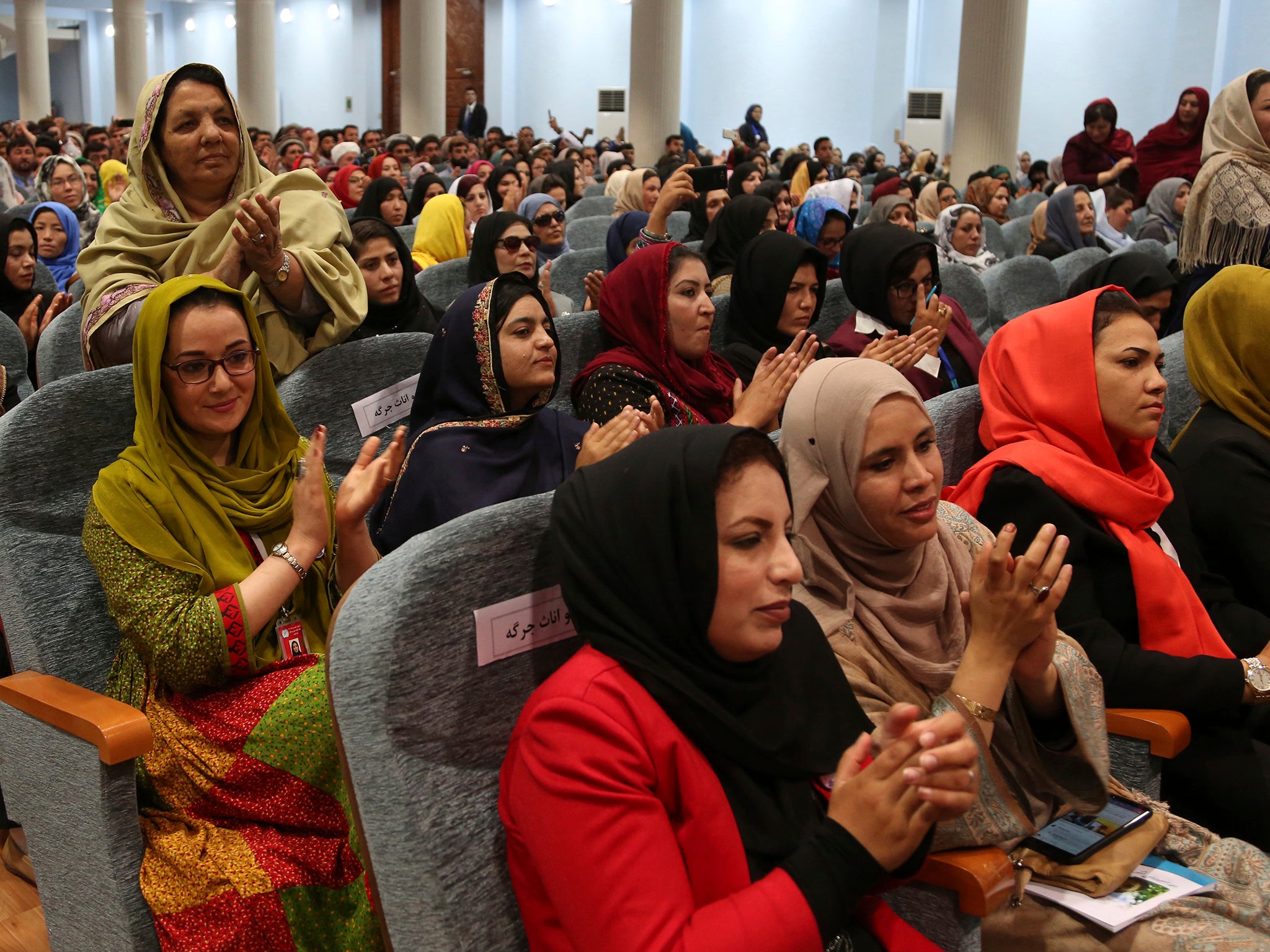Female delegate told she ‘should be in the kitchen’ at Afghan peace talks with Taliban
Former warlord known for his harsh views on women’s rights appointed to chair assembly

An Afghan assembly to discuss peace with the Taliban has been criticised for making female delegates feel unwelcome, with one woman told she “should be in the kitchen”.
The assembly, known as a loyal jirga, was convened by President Ashraf Ghani to debate Afghanistan’s path to peace. Organisers said that around 30 per cent of the 3,200 delegates were women.
But several female delegates said they felt ignored, marginalised or patronised. They were told that men should lead the jirga’s 51 committees and women should serve as secretaries.
Some women complained that they were groped and fondled – not by men, but by women who patted them down during security checks.
On the second day of the assembly, a female delegate who rose to speak was ordered to be quiet by a male delegate.
“He told her: ‘Peace has nothing to do with you. Sit down, you should be in the kitchen cooking!’” said Behnoh Benod, 31, a male delegate who witnessed the put-down.
Other women said they had been confronted by male delegates who claimed to support women’s rights, but only under sharia, or Islamic law – a view shared by the Taliban.
“I asked them which sharia law, the Taliban sharia law or Isis sharia law,” said a delegate, Sakina Hussaini, referring to the Islamic State.
“Some men didn’t accept women as human beings and I had to scream at them,” she said.
Male delegate Behnoh Benod said just 16 of the delegates on his 108-member committee were women. A male delegate was selected as committee chair. Of the 51 committees, 13 were headed by women, and 28 elected women as committee secretaries.
For many women, the jirga got off to a bad start when Ms Ghani appointed as chairman Abdul Rab Rasoul Sayyaf, a combative former warlord known for his harsh views on women’s rights.
When a female delegate complained directly to Mr Sayyaf , she was hustled out by security guards. Other delegates hooted and clapped to drown out her protest.
State-run television RTA, which broadcast the proceedings, posted a banner on Twitter showing images of Mr Ghani and Sher Mohammed Abas Stanekzai, the chief Taliban peace negotiator.
Beside them were photos of two women with their faces covered – one by a niqab, a veil that leaves the eyes visible, and the other by a burqa, the garment forced upon women under the Taliban regime that was toppled in 2001.
After a torrent of complaints on social media, a new banner appeared. Ghani and Stanekzai were still depicted, but four smiling women wearing head scarves that left their faces uncovered were added to the two with their faces concealed.
On Monday, as the jirga opened, some female delegates arrived dressed in burqas.
“Most of these women have come from provinces and they have no idea why they are here,” said delegate Taiyaba Khavari.
Ms Khavari and other women said they grew disillusioned as they were insulted or interrupted by male delegates.
Torpekai, 45, a delegate who goes by one name, said she had been pleased to be among war victims invited to Kabul. She said her 18-year-old son, a police officer, had been killed by the Taliban.
Torpekai said she had planned to tell delegates that she wanted the Taliban punished if a peace deal gave them a role in a postwar government. But the men who dominated the jirga did not bother to listen.
“No one would hear me out,” Torpekai said. “They said women shouldn’t be here – this isn’t a discussion for women.”
It was not just women who felt disillusioned by the jirga. Social media lit up with comments from Afghans who dismissed the assembly as a patronage tool for Mr Ghani. Some critics said the jirga usurped Afghanistan’s parliament.
The government shut down the capital for five days, giving government workers the week off.
The jirga was caught up in a bruising presidential election campaign, in which Mr Ghani is struggling to stay relevant while his government is excluded from peace talks in Doha, Qatar, between the Taliban and the United States. The militants refuse to meet with the government, calling it illegitimate.
Jirga organisers said it was an effective exercise in grassroots democracy that incorporated a wide range of Afghan society. Among the delegates were urban and rural residents, victims of war and terrorism, young people, traditional elders, and ulema, or Islamic religious scholars.
Organisers said that with the government sidelined at the peace talks, the jirga produced a national consensus on conditions for peace with the Taliban. The assembly’s recommendations are not legally binding.
“It’s our sacred tradition,” said Mohammed Umer Daudzai, who organised the gathering. “I doubt that anybody will say consensus building or dialogue is a bad idea.”
At the close of the jirga on Friday, Mr Ghani accepted its recommendation to seek a ceasefire, a goal of the Doha peace negotiations. He urged the Taliban to negotiate within Afghanistan and said he would release 175 Taliban prisoners.

Among other recommendations accepted by Mr Ghani was a demand that any postwar government honour the Afghan constitution and protect the rights of women and children. He thanked the delegates, “especially the women”.
One delegate, Wazhma Tukhi, 25, said she was satisfied. “The constitution protects our rights, and that’s all Afghan women want,” she said.
But another, Masuma Bahar, 24, said the jirga should have made a stronger case for preserving women’s gains over the past 18 years. “There were women on the board and they should have raised their voices, but they haven’t done anything,” she said.
New York Times
Join our commenting forum
Join thought-provoking conversations, follow other Independent readers and see their replies
Comments
Bookmark popover
Removed from bookmarks